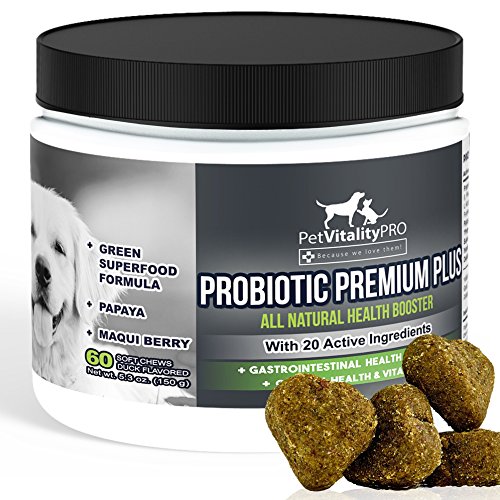
Using Probiotics For Dogs: What You Need To Know
Probiotics for dogs are becoming more and more popular these days and with good reason. As in humans, a dog's gut contains a variety of different bacteria, many of which are essential for helping the digestive system to function properly. A healthy digestive system can have a good effect on general health, so keeping the balance of bacteria in the gut intact is an important step in maintaining overall good health.
Unfortunately, the "good" bacteria in the gut can sometimes be destroyed, causing an imbalance which can subsequently lead to poor digestion, excess gas, diarrhea, more intense allergic reactions such as itching and hot spots, and even behavior issues. This is why it is so essential to try and keep the balance of "good" and "bad" bacteria level. The more "good" bacteria there are, the better your pup's gut will function…it's as simple as that.
There are a number of potential triggers that can lead to bacterial imbalance, including infection, stress, poor diet, old age, parasites, and the use of antibiotics. While antibiotics can certainly be an important weapon in fighting various health issues they are designed to wipe out all bacteria, which can lead to a dangerous imbalance. This is why probiotics for dogs are often recommended after your pet has taken a round of antibiotics.

Evelina / stock.adobe.com
Stress is another big factor. Something as simple as going to the vet, being boarded in a kennel or even competing in dog shows or agility trials can trigger a stress reaction in dogs, which can in turn affect the gut. This is true for all breeds, particularly those that are high strung, but can even present in breeds like the Australian Shepherd that are used to working and performing in dog sports of all kinds. Stress can hit any dog at any time and it can take a real toll on the gut.
When your dog experiences digestive issues, often your vet will point to an imbalance of bacteria in the gut and he may suggest the use of probiotics for dogs. These are supplements that can be added to food or fed to your dog directly and contain a number of different strains of active bacteria. The type of probiotic you choose and the way you administer it are both very important as the bacteria can only do their job if they actually reach the gut intact.
Use Probiotics For Dogs Rather Than Those Formulated For Humans
Probiotics designed specifically for dogs come in several forms including powders, chews, capsules, yogurt, or kefir with live cultures, specially formulated dog foods, or right in a dog treat like PetVitalityPRO.
Powders, like Purina Fortiflora Canine Nutritional Supplement, are particularly popular as they are very easy to administer. You just sprinkle the tasteless powder onto your dog's food and he gets all of the beneficial bacteria he needs in one step; there is no need to try and force a pill down his throat or try to hide it in his food.
Since the biology of the human and canine gut differs, most vets recommend using probiotics for dogs rather than giving your pet a product designed for humans. If your dog is suffering from gastrointestinal issues, it's a good idea to see your vet and discuss the possibility of supplementing with probiotics. He'll be able to recommend particular strains, brands, and dosing to help improve your dog's health.
A healthy gut can lead to a healthy dog so you should never underestimate the importance of keeping the bacteria in your dog's gut properly balanced. With a regular dose of probiotics, your dog can be looking, feeling, and acting healthier through every stage of his life.
Have Dog Training Questions?
Check out these introductory dog training videos...
I want my dog to stop being aggressive.
I want some help training my new puppy.
I want my dog to stop barking at everything.
Get Australian Shepherd Info, Website Updates, Special Offers, and Cartoons...
FREE GIFT
You'll also receive a free copy of the ebook
My Everyday Dog Training Tools
by professional dog trainer Daniel Abdelnoor, "Doggy Dan"












 Loading Image...
Loading Image...